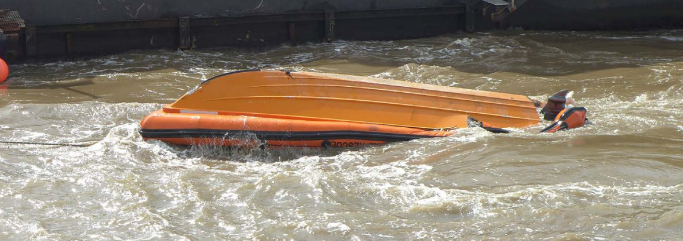As UK MAIB reports in its most recent Safety Digest, in the early hours of the morning, the master of a twin azimuth stern drive port tug ordered the main engines to be started and for the crew to “Let go” the mooring lines in preparation for meeting an inbound vessel.
The incident
The tug had been laid alongside another tug at a floating pontoon. After accepting propulsion control from the engineer in the engine room, the master struggled to break clear due to the strong tidal stream. To prevent a collision with the other tug, full astern was being used on both engines when the port propulsion unit alarm sounded and the tug began to spin clockwise to starboard, narrowly missing both the moored tug and the floating pontoon.
The tug continued its spin to starboard while the master tried to respond to the problem. The darkened bridge meant that it was difficult to see the azimuth direction indicators as he attempted to arrest the spin. The port shaft revolutions indicator was not working and the master had to rely on the starboard shaft indicator for his information. He sounded the general alarm to warn the other two crew that he had a problem. Having let go as instructed, the mate returned to the wheelhouse and, to try and assist the master, operated the wheelhouse buttons to ensure they had correctly engaged when propulsion control was taken from the engine room.
The tug’s bow made hard contact with an adjacent floating pontoon’s handrails and pontoon air tank. Its port quarter then made heavy contact with a moored rigid inflatable boat (RIB), the impact of which caused the RIB to capsize and its landing stage to sink. The tug’s stern and starboard side then rotated close to the shore before full propulsion control was regained and the master manoeuvred the tug out into the river. The master informed the port’s vessel traffic services (VTS) of the incident and advised the pilot on board the inbound vessel of the tug’s propulsion fault. He then returned the tug to its berth for a closer inspection of the damage.

Lessons learned
- Check: The qualified and experienced master, mate and engineer joined the tug 6 days before the incident and had completed nine jobs over 5 days, three of which occurred at night. Their regular tug was undergoing a refit and they had operated this tug infrequently over several years. However, the tug spun four times over a 4-minute period before being brought under control, demonstrating incomplete propulsion system operational knowledge and insufficient emergency response skills. The clockwise spin to starboard after the master went full astern on both propulsion units indicates that the master only had control of the starboard unit. Proper pre-departure checks of the propulsion system would likely have identified that control of the port propulsion unit had not been successfully transferred to the wheelhouse.
- Aware: The vessel familiarisation forms for the master and chief engineer required detailed knowledge of the tug’s propulsion systems and what actions to take in an emergency situation such as a blackout and loss of propulsion. The wheelhouse reflected the vessel’s age and comprised several different types of controls, various means of portraying information and a range of different alarm and indicator methods. Each control function was fitted with a dimmer to adjust the brightness of the indicators at night. Familiarity with such an inefficient layout requires time and experience, particularly when working with dimmed indicators at night, and the master must maintain a good lookout. Familiarisation forms should be recognised for their training and safety benefits rather than considered an unnecessary hurdle before letting go the mooring lines.
- Risk: The azimuth directional indicators were hard to read due to the glass covers becoming less transparent with age. The port shaft indicator had failed a day earlier after an attempt to replace the internal lamps resulted in a broken indicator needle. A temporary needle repair was unsuccessful and the master, unable to adjust the brightness of the new lamps, resorted to covering the indicator with a piece of paper. A defect report submitted on the same day stated: (Still) able to operate equipment and requires repair asap. As a result, the master relied on the starboard shaft indicator for both shafts. Risk assessments are essential to identify the potential hazards arising from inoperative or ineffective propulsion controls and indicators and when to keep the vessel in operation or withdraw it from service for repairs.
- Communicate: Many of the wheelhouse and engine room controls were labelled in Dutch and only a few had been relabelled in English. This, coupled with the crew’s lack of familiarity with the vessel, exacerbated the potential for errors and misunderstandings. Incorrect assumptions about the meaning of a switch label can have expensive consequences.






























































